|
|
|
Sort Order |
|
|
|
Items / Page
|
|
|
|
|
|
|
| Srl | Item |
| 1 |
ID:
189247
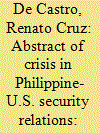

|
|
|
|
|
| Summary/Abstract |
This article explores the prospect of transforming the Philippine-U.S. alliance into a security partnership. In the past, the Philippines doubted the U.S.’s often-repeated commitment to assist its ally because the 1951 Philippine-U.S. Mutual Defence Treaty (MDT) merely stipulated consultation rather than an automatic armed response in case of an armed conflict. In mid-2011, the Aquino Administration asked for an unequivocal U.S. guarantee to defend the Philippines and its naval/air units deployed in the Spratlys. The Duterte Administration, however, has expressed its uncertainty over America’s willingness to back the Philippines militarily in any confrontation with China over the disputed maritime territory. Early this year, President Rodrigo Duterte commented that an armed clash in the South China Sea would crush the Philippines because the involvement of American forces would make the conflict spiral out of control. This development, along with his decision to abrogate the 1997 Philippine-U.S. Visiting Forces Agreement (VFA), has generated a crisis in the alliance. To avert any break-down in their overall security relations, the two allies can explore the possibility of downgrading their alliance to a security partnership. In conclusion, the article argues that should the Philippines consider this option, it must take into account the following: the consequence of losing the deterrence effect of a defence treaty with the world’s most powerful nation; the impact on Philippine defence spending; on the ongoing Armed Forces of the Philippines’ (AFP’s) modernisation program; and whether or not the Filipino nation will support this move.
|
|
|
|
|
|
|
|
|
|
|
|
|
|
|
|
| 2 |
ID:
189245


|
|
|
|
|
| Summary/Abstract |
This article examines the new prominence accorded to the “Indo-Pacific” (IP) concept in the strategic narratives championed by the US and its closest allies, (Japan and Australia), and then juxtaposes this with the responses of other key regional powers. To this purpose, Part I distils a concise conceptual model encompassing three interlocking facets – mental maps, political/ideological drivers, and visions of regional order – designed to structure the following empirical analyses. Part II then accesses this model to reveal how these facets are reflected in the discursive and policy-making practices of the US and its close allies, as embodied in their (combined) regional strategies. Next, Part III considers how a cross-section of major states in the region – India, South Korea, and China - have responded to this enterprise, to determine the degree to which they have adopted, accommodated or opposed the IP concept, or otherwise propose national alternatives to the US-centered project. It concludes that the IP concept is not simply an objective geopolitical descriptor, but rather a controversial and contested discursive field, subject to multiple interpretations. Such a polarizing concept will likely contribute to further sharpening of strategic mistrust and geopolitical competition amongst the region’s major powers.
|
|
|
|
|
|
|
|
|
|
|
|
|
|
|
|
| 3 |
ID:
189248
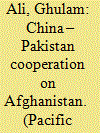

|
|
|
|
|
| Summary/Abstract |
This article studies China’s and Pakistan’s key interests in Afghanistan, and their mutual cooperation to pursue them. It identifies security, energy, connectivity and geopolitics as China’s main interests. Get recognition of the Durand Line as an international border with Afghanistan, prevention of ‘hostile elements’ from using Afghan territory and access to the CARs as those of Pakistan’s motives. Both sides cooperated with each other on Afghanistan under the umbrella of their strategic partnership. Islamabad helped in establishing initial Taliban-China contacts and persuaded the Taliban for negotiations with the USA and Kabul authorities. Beijing supported Islamabad’s Afghan policy and mediated between Islamabad–Kabul and Taliban–Kabul negotiations. China and Pakistan backed their diplomacy with economic assistance and extended CPEC and BRI to Afghanistan. Amidst various challenges, thus far Sino-Pakistan cooperation on Afghanistan has benefited to their mutual interests and contributed to the peace process. Afghanistan has emerged as a new chapter of their relationship. How Sino-Pakistan cooperation advances in this troubled country in future is yet to be seen.
|
|
|
|
|
|
|
|
|
|
|
|
|
|
|
|
| 4 |
ID:
189246
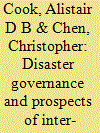

|
|
|
|
|
| Summary/Abstract |
The Southwest Pacific is considered one of the most vulnerable regions in the world to natural hazards. Five of the Pacific Island States (PIS) rank among the top 20 most-at risk countries in the World Risk Index, with Vanuatu and Tonga ranking first and second respectively. The Southwest Pacific neighbours Southeast Asia and both regions are exposed to a variety of natural hazards, resulting in significant damage and loss of lives annually. Similar exposure to climate-induced hazards raises the potential to create a coalition of affected states from the Asia-Pacific to share knowledge of disaster governance in areas where niche capabilities have been developed and shape the global debate on the effects of natural hazards and climate-induced disasters. This article argues that inter-regional partnership on disaster governance is the next step in the Asia-Pacific to respond to a collective action problem affecting two sub-regions - Southeast Asia and the Southwest Pacific. Through the conduct of desk research and interviews, this article first presents findings and observations on the disaster governance landscape and future developments in the Pacific. It then discusses disaster management frameworks and initiatives that ASEAN has institutionalised, and how work in the two sub-regions can complement one another and provide a platform to help shape the global agenda on disaster governance and climate change.
|
|
|
|
|
|
|
|
|
|
|
|
|
|
|
|
| 5 |
ID:
189250
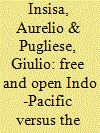

|
|
|
|
|
| Summary/Abstract |
Recent scholarship suggests that the thawing of diplomatic relations between China and Japan has caused a readjustment of Beijing’s Belt and Road Initiative and Tokyo’s Free and Open Indo-Pacific Vision towards an emerging complementarity. Through careful process-tracking, elite interviews, and analysis of Chinese and Japanese primary sources, this article instead demonstrates how, outside of the East Asian spotlight, Sino-Japanese geo-economic competition continues in South Asia and the Mekong subregion, fueled by power politics and a mutual distrust of each other’s initiatives. On the basis of this evidence, this article qualifies Sino-Japanese interactions as a quest and denial for spheres of influence, whereas the Japanese government aims at denying Chinese spheres of influence. In doing so, this article highlights how Japanese proactivism from Sri Lanka to Thailand, via infrastructure and government financing, has become a driver of growing non-traditional security cooperation with India, the U.S., and Australia.
|
|
|
|
|
|
|
|
|
|
|
|
|
|
|
|
| 6 |
ID:
189244


|
|
|
|
|
| Summary/Abstract |
The paper describes the growing human rights gap between China on one side and the US and Taiwan on the other side and analyses its impact on cross-strait relations. Since Xi Jinping’s ascent to power in the People’s Republic of China in 2012/2013 and the elections of Donald Trump in the US and Tsai Ing-wen in Taiwan in 2016, the relationship between China and the other two countries has worsened. The US and Taiwan have a similar view on human rights in the PRC. The increasing repression and authoritarianism of the PRC leads to a human rights gap in the Taiwan Strait that increases the divide and the tensions between both sides. The failure of the PRC to address in its proposal for a peaceful unification the concerns of the Taiwanese for their democracy and human rights pushes Taiwan further away. The similar assessment of the PRC’s authoritarian threat by the US and Taiwan strengthens the bond between both, based on the shared values of democracy and human rights.
|
|
|
|
|
|
|
|
|
|
|
|
|
|
|
|
| 7 |
ID:
189249
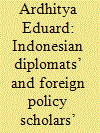

|
|
|
|
|
| Summary/Abstract |
The question of whether China’s rise to power will be peaceful cannot be evaluated without considering the actions of other major powers. Therefore, this study seeks to explore how Indonesia formulates its response to a rising China. Although previous studies have recognized the importance of perception in shaping Indonesia’s strategic response toward China, previous scholarship has not achieved a systematic investigation of Indonesians’ perception of a rising China. Therefore, this study applies image theory from international relations scholarship to carry out a qualitative content analysis of empirical data collected during interviews with Indonesian diplomats as well as foreign policy scholars. This study finds that perceiving China as presenting a degree of threat rather than opportunity is the dominant perceptual trend among individuals in this study sample. The relatively moderate degree of threats from China were characterized more as economic exploitation and political subordination, than as military attacks or occupation. However, these should be evaluated alongside findings that those individuals are more perceptually sophisticated in their approach to understanding China. This finding therefore suggests, that in the foreseeable future, Indonesian foreign affairs bureaucracy will hardly encourage Jakarta to notably shift Indonesia’s orientation toward the rising power.
|
|
|
|
|
|
|
|
|
|
|
|
|
|
|
|
|
|
|
|
|